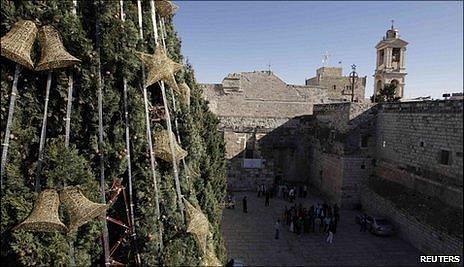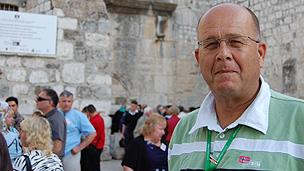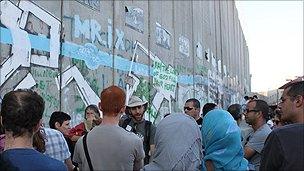Politics mars record year for Holy Land tourism
- Published

Bethlehem is celebrating a rise in numbers of Christian pilgrims visiting
Large crowds of tourists enjoy the Christmas lights decorating Manger Square in Bethlehem as they wait in line to enter the Church of the Nativity.
"If you are a Christian from Nigeria you want to see the place where Jesus was born," says Ajiboye Bola excitedly. "All you were reading in the Bible, you see that it was real."
"It was very important to come here for historical purposes, for our culture," says Paul Shackner from Florida.
Israel's tourism ministry says 2010 has been a record year.
It expects 3.4 million tourists, including 2.4 million Christians, to have visited the country by the end of December. According to officials, half the Christians arriving in Israel also travel to Bethlehem in the occupied West Bank.
'Bridge of peace'
The Israeli Deputy Director General of Tourism, Raphael Ben Hur, insists his ministry "doesn't do politics" and stresses the economic benefits of co-operation with the Palestinian Authority.
"We don't have any dispute when it comes to the pilgrims in the Holy Land because this is a bridge of peace," he says.
"With all due respect to the politicians, I want to tell you it's very difficult to divide the Holy Land. You can't say to a guest, 'Come to Jerusalem and don't come to Bethlehem'."
However, Israel's security concerns mean that most tourists must enter the Palestinian city of Bethlehem from Jerusalem, crossing an Israeli checkpoint and passing the eight-metre high West Bank barrier which surrounds the town.
Some two million visitors are expected to make the trip to the West Bank in 2010, and Palestinian officials say the role of politics should not be downplayed.
"There are a lot of issues which are very rooted in the political conflict," says Palestinian tourism minister, Khaloud Daibes.
"The occupation cannot be beautified. Israel is still monopolising tourism for its benefits and putting a lot of pressure on our side."
Israel - which has occupied the West Bank and East Jerusalem since 1967 - severely restricts the movement of people in the Palestinian territory, citing security concerns.
Ms Daibes says Israel also controls archaeological sites on land claimed by the Palestinians and has not allowed them an airport of their own.
Trading tour guides
In the grotto under the nativity church, Israeli guide, Mikey Horesh, points out the star marking the spot where Jesus is said to have been born.
He first did the tour 15 years ago, but then there was a long hiatus. The Israeli authorities did not allow Israeli guides into the occupied West Bank for security reasons after the Palestinian intifadas, or uprisings.
Only this year, Mr Horesh was among 100 Israeli guides and bus drivers who were given a special state licence to come back to Bethlehem as part of a pilot project.

Fifty Israeli tour guides and 50 bus drivers are now licensed to operate in Bethlehem.
"We really missed this because it's part of the pilgrim tours," he says. "We had to send tourists through the border, through the checkpoint, to passport control, and then to join a Palestinian bus and a guide. We didn't know what was happening."
The Palestinian authorities now want it to be made easier for their licensed guides to work in Israel, which they say is in accordance with agreements both sides have signed.
Instead they worry that restrictions could be increased, affecting even those with Israeli residency, living in Arab East Jerusalem.
Recently a group of Israeli members of parliament proposed legislation that required large tour parties to be shown around Jerusalem by an Israeli citizen. They argued Palestinians could present a biased history.
The draft bill was dropped, but the chairman of the guides' union in East Jerusalem and the West Bank, Samir Bahbah, insists the suspicions at the heart of it were not justified.
"It's obvious for tourists, they know everything, they are not stupid," he says.
"They know there is politics, there are checkpoints and a separation wall. When we are asked about that, I'm asking my colleagues not to go in-depth on the politics, not because the Israelis dictate that to us, but because most tourists are on a pilgrimage. They want to know about spirituality."
Tours with a twist
Even though tourism is highly politicised, there are groups trying to bridge divides.
After about 30 Israelis arrive in Bethlehem their party joins more than a dozen Palestinians from Jericho, for a joint tour.

A joint Israeli and Palestinian tour group seeks to overcome barriers.
They take a look at the church, share a falafel snack and are then taken to a refugee camp and to meet people living by the barrier.
"I see it from the other side as I drive home, but I never saw it close up with all this graffiti on it," exclaims a woman from Jerusalem.
While Israeli citizens are not ordinarily allowed to travel to the occupied territories, Visits 2 Palestine arranges military permission for them to go for the day.
"It's been a year and I'm glad to say that almost 1,000 Israelis have come to Bethlehem and Jericho since," says co-founder, Noa Maiman.
"The older generation, kind of our parents' generation, in their fifties and sixties, for them it's quite regular, because it used to be like that. But for our younger generation that was brought up to terror attacks and to fear, it's completely mind-changing just to be able to come here."
For the Palestinians involved, who cannot freely visit Israel, the chance to meet Israelis who are not in uniform is part of the appeal. There are frank exchanges on food, traditions and politics.
The trip ends with the entire group playing traditional Arab music and dancing at a coffee shop.
While increased tourism of this kind seems a long way off, it is an encouraging display of how it could bring the two sides together.